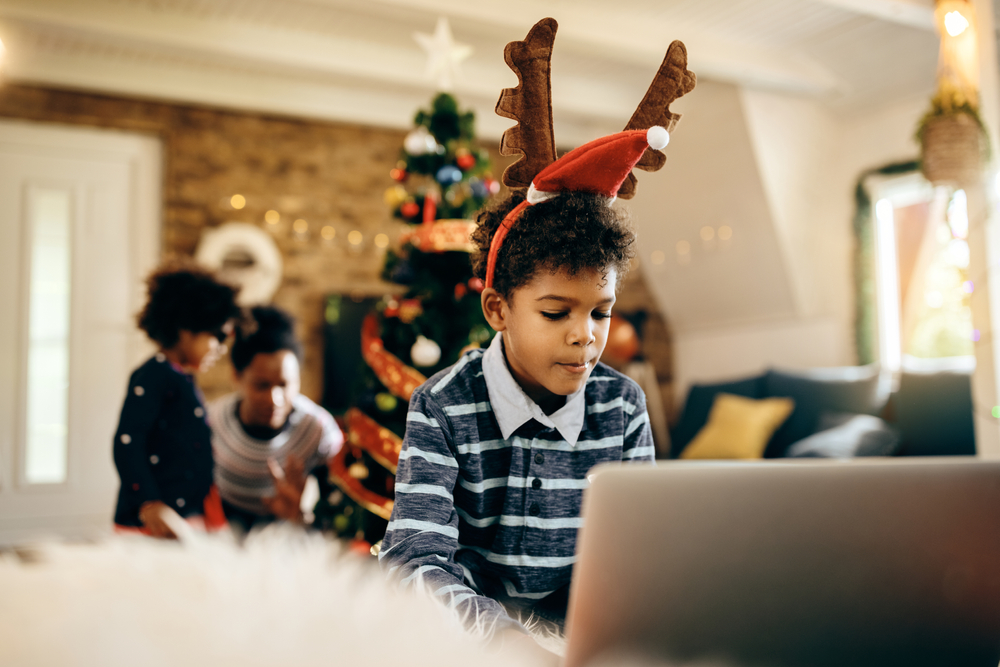
Our society has fundamentally shifted over the past few years. As adults, we do so much of our work, learning and socialising via the internet, so, naturally, the same thing is true for our children. As we think about what to buy loved ones for Christmas, it is important that parents feel confident about the digital devices their children are using to learn, socialise and play – whether those are laptops, gaming consoles or smart cuddly toys.
In the UK, 90 per cent of 11-year-olds now own a smartphone. This access to digital tools has enormous benefits for young people, helping them learn new skills, stay in touch with friends and explore their imaginations. It is vital they have positive experiences online and that’s why internet safety is now a core part of the school curriculum.
Google partnered with digital family life experts Parent Zone in 2018 to create Be Internet Legends, a multifaceted programme that has now been used in nearly three-quarters of UK primary schools, reaching more than one million children in 2021 alone. Research* has found that children who have done the training show a 50 per cent uplift in their understanding of internet safety, while seven in ten use kinder language online.
Vicki Shotbolt, CEO at Parent Zone, says that open conversations about online safety need to be continued at home to be truly effective, and that parents should try to find a balance between age-appropriate supervision and giving their children space to play and learn.
“[Internet safety] is talked about a lot in school,” she says. “But it’s not enough just to teach children these things – it’s about instilling positive behaviours and making sure they know these apply online as well as offline. These are messages such as being kind and considerate, not going to new places without telling parents or asking first before spending money.”
Shotbolt is an advocate for gifting technology to children. When choosing a present, she says that the most important consideration is to pick something that will bring your child joy and spark their imagination. “I really do think that can guide you more than anything else at Christmas,” she says.
Her top tip is to set parental controls on any device before wrapping it. “Don’t wait until they unwrap it to start thinking about the settings,” she says. “When it’s in your child’s hands on Christmas morning, the last thing they’ll want to do is give it back to you.”
There are free and helpful tools that can give you the confidence and support you need to build healthy digital habits in your family. One is Google’s Family Link app, which allows parents to monitor their children’s online activity and set digital ground rules, such as time limits and a device bedtime. You can turn on Google SafeSearch, which filters out explicit content from search results and is already on by default for children aged under 13 who are signed into an account managed with Family Link.
When it comes to apps, you can pre-download child-friendly ones via the Kids section on Google Play, including YouTube Kids, which provides a more contained environment for children to explore video content and makes it easier for parents and caregivers to guide their journey. You can also switch on parental controls via your broadband provider, which will cover all devices in your home.
Talking to your kids about the importance of privacy as they begin to use any new device can help reinforce what they learn at school – like setting strong passwords, not sharing these with anyone and never putting personal details into websites before checking with a parent. “It’s balancing these practical things with positive behaviours,” says Shotbolt. “Getting both of these in place means a child will be safer.” Together, these can help kids become more informed and engaged online citizens.
It’s natural that when a young person gets a new gadget, they won’t want to put it down – and this is not a bad thing, says Shotbolt. “Christmas is an exceptional time of year,” she says. “Parents shouldn’t beat themselves up over their child spending time in front of a new device.”
Beyond the festive period, finding a healthy balance for screen time is different for every family. Research increasingly suggests that it is not necessarily the quantity of time spent online but the quality that matters, and ultimately, content does not need to be educational to be worthwhile.
“The focus should not be on how much time they’re in front of a screen but on whether it is adding or taking away from their life,” Shotbolt says. “It doesn’t have to be a maths puzzle or learning Mandarin to be enriching – it could just be creative play. If they’re happy and flourishing, that’s the most important thing.”
Plus, time spent online can help your child learn and understand the digital world and make informed choices about its risks. Interactive resources such as The Legends Family Adventure short films and the Interland game can help them continue to cement digital skills at home. “The gorgeous, animated films teach positive behaviours, then children can practice them in a safe gaming experience,” Shotbolt says.
Introducing young people to new technology can be extremely beneficial: gaming teaches team-working skills, video-calling helps them socialise, and online exploration can lead to greater independence. As long as your child is practising good digital citizenship, connected gifts can be far more than fun – they can be a critical part of your child’s learning and development.
*Data based on research commissioned by Google and run by Ipsos from April to July 2021 among 1,638 primary school pupils in years three to six at 16 schools in the UK where Google has carried out Be Internet Legends online safety training. For more details, please read our technical notes.



